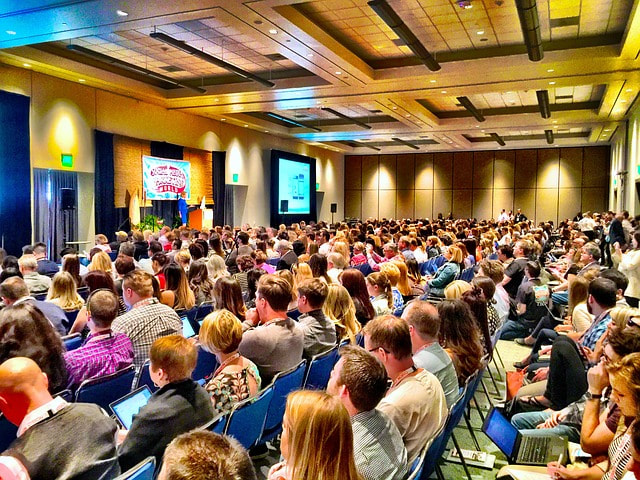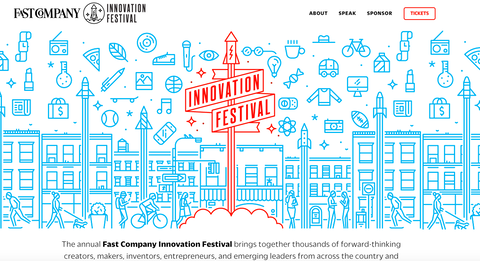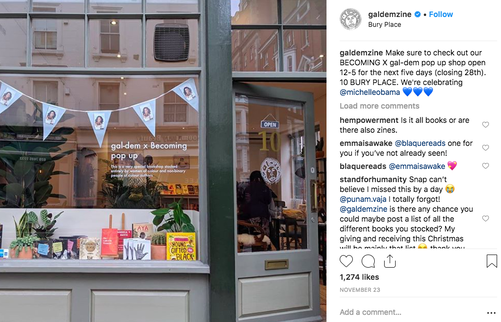|
.A recent study published by the Journal of Advertising Research found that events have a considerable impact on fostering a ‘positive brand experience’ amongst consumers, and that people who had attended a brand’s event ultimately ‘gave more value to that brand’. The evidence shows that, with careful and strategic planning, events are an incredibly powerful marketing tool for businesses of any size or industry. In this post, we highlight seven essential reasons why events should be part of your marketing strategy. 1. Build Brand RecognitionIn today’s competitive consumer market, brands have to work harder than ever to build a memorable, unique identity that encourages customers not only to choose their product in the first instance, but to keep on doing so well into the future. Experiential events can be a powerful resource to build brand recognition and establish long lasting connections between company and client. Take well-established financial giants Prudential, for example, who recently held an entirely unique, interactive event as part of Fast Company’s Innovation Festival in New York Grand Central station. Described by the organisers as a ‘hands-on, head-scratching, heart-pounding interactive experience where you escape financial challenges’ in your parents’ basement, the event was an astute attempt to engage the notoriously financially insecure and fickle Millennial generation. Tapping into two Millennial truths; a ubiquitous love of escape rooms and fear of languishing in financial limbo in their parents’ houses forever; every element of this event had their focus audience firmly in mind and helped build brand recognition amongst the future generation of potential clients. 2. Engage Existing CustomersEnticing new customers is essential to maintaining growth for any business, but too often companies take their current customers for granted. Nurturing your brand’s relationship with current customers is crucial to establishing brand loyalty. The key here is to host engaging, educational seminars, exhibits or speakers that prioritise genuine interaction rather than being a blatant sales pitch. Canon has sought to do just that with their ‘Portals’ exhibition in New York City. This interactive space consisted of five different portals, each designed to help users hone a specific photographic technique using their Canon cameras. For example taking pictures in low light, or from a reflection. This is a hands-on approach to developing people’s photographic abilities; think how different the effect would have been if Canon had simply held a conference or seminar on the same topic. 3. Gather Product FeedbackEvents centred around a product or service launch provide the perfect opportunity to get immediate, valuable feedback from the people that matter most. This gives you the chance to iron out any kinks, and respond to any questions or issues that arise. Innovative sports apparel brand Under Armour invited fans to come and test out their ‘ColdGear’ range, designed to withhold freezing temperatures, in the world’s first ever ‘Ice Gym’. Visitors had the opportunity to complete extreme cold weather workouts in a purpose-built igloo, participate in challenges and win prizes. Hosting an immersive fitness experience not only demonstrated their commitment to delivering a good product, but also communicated the value they place on involving their fans in an ongoing conversation around their offerings. 4. Add Value to Your OfferingHosting events that provide value beyond your product or service is essential to maintaining a meaningful relationship with customers and diversifying your audience. The key here is to shift the focus of your event away from just sales and lead generation towards a topic that provides relevant, practical advice and knowledge. Software company, Hubspot, have developed a specific global event series under the banner ‘Grow with Hubspot’, designed for marketing and sales professionals looking to grow their businesses. These valuable free seminars and discussions are open to the wider public, not just customers, and demonstrate Hubspot’s genuine interest in providing a service to the wider community. Naturally, they also highlight the benefits of their own products as part of these sessions, but they aren’t the sole focus. 5. Expand Your AudienceReaching out to new audiences is an essential aim of any well-focused marketing strategy. Partnering up with a like-minded business to host events provides the perfect platform to engage with potential new customers and further build brand recognition amongst a new demographic. By joining forces, you can expand your audience and bolster your sales pipeline within a tighter budget. Online magazine Gal-dem recently teamed up with publishing house Penguin to create a pop-up shop in central London celebrating the work of female authors, which coincided with the release of Michelle Obama’s acclaimed autobiography. By collaborating to create a temporary, physical space for an otherwise exclusively online platform, both companies benefited from engaging with new customer bases and added value to their own brand. 6. Develop Your Client DatabaseAlong with expanding your audience, comes developing and nurturing those new connections into tangible leads. In order to foster an ongoing relationship with potential clients that lasts far beyond the event itself, it’s crucial to capture as much data as possible. Oh Comely Magazine recently held a crafty ‘Workshop Weekender’ as part of vintage brand Beyond Retro’s partnership with online retailer Birdsong. By inviting participants to register for a ticket before the event, Oh Comely was able to communicate important information about the event to invitees, but also build up a valuable database of contact details to use in the future. When holding your own event, tailor your sign-up form to make sure you capture need-to-know contact details alongside information that could be useful to you such as age, location etc. Just be sure to get consent before contacting them! 7. Drive Sales MomentumIt’s a common misconception that where event marketing excels in building brand exposure, it lacks in generating cold hard cash. In reality, generating a high-return on investment is easily attainable with strategic event planning, even on a smaller budget. One way to achieve this is by hosting regular, smaller scale and ticketed events throughout the year. Another approach is to give conference attendees creative branded merchandise as part of an event showbag. By giving away products featuring your brand your company will stay top of mind long after the event has finished. A start-up plant shop in Hackney, Botany, holds regular workshops on-site that provide an additional revenue stream and encourage cross-selling. The line-up so far has included horticultural events such as ‘Festive Wreath Making Workshop’ and ‘Happy Houseplants’, and broader topics such as ‘Photography 101’ and ‘An Education in Natural Beauty’. This is in keeping with the brand’s core ethos that they are ‘Not Just A Plant Shop’. These are just some of the many potential positive outcomes of a carefully planned event marketing strategy. When done right, successful events have the power to build brand recognition, strengthen loyalty and can boost sales both over the short and longer term, no matter the size or budget of your organisation. Guest Author BioRosemary Mckee:Although 25 years have passed since Rosemary's first pin badge order at Rocket Badge, she remembers just about everyone! She's famous for her efficiency, outstanding product knowledge...and for actually supporting Leeds United.
Comments are closed.
|
AuthorCategories
All
Archives
May 2023
|





 RSS Feed
RSS Feed


